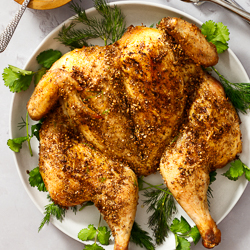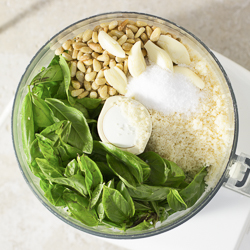You’re making a homemade soup, sauce, or stew, or maybe something else, and you went to the trouble of buying good ingredients, and cutting them up, and measuring them out, and cooking them. And then at the last minute you realize the recipe called for low-sodium broth and you used regular. Or you decide to toss in some leftover ham that turns out to be super intense. Or you simply get a little too enthusiastic with the final seasoning. And the dish you so lovingly created is absolutely inedibly salty.
What do you do?
Here are some tips to remedy the situation, plus an ounce-of-prevention bonus.
1. Dilute.
The best way to make a dish less salty is to literally do just that—decrease the overall proportion of salt. With a soup—for example, this Colorful Vegetable and Lentil Soup—add more liquid, more solids, or both. Or make a new batch, or partial batch, then combine the two.
Perhaps obviously, whatever you add should be pretty devoid of salt. If you’re diluting with canned beans or broth, for example, use low- or no-sodium.
2. Add something starchy.
You may have heard that you can put a whole, uncut potato in a pot of, say, soup, take it out later, and the soup will miraculously be less salty. Um, no.
But diced potatoes, added to the pot to become part of the soup, can work wonders.
Why? Because starchy ingredients like potatoes, grains, and pasta are typically bland and so typically can take a lot of salt. Adding them dilutes your soup, yes, but because of their higher-than-average need for salt, they end up being especially hard-working dilution tools.

3. Add something fatty.
Rich and creamy ingredients, from cheese to cream to an olive oil garnish, will coat your palate and dull the experience of the salt.
4. Add acidity or sweetness.
Adding something acidic—like a splash of vinegar or a squeeze of lemon—or something sweet—like a pinch of sugar or drizzle of honey—works to sort of distract your palate. Turn to this remedy only when your food is a little too salty, because if it’s so salty that it needs a lot of acidity or sweetness, you can end up with a dish that’s too acidic or sweet. Which only creates a new problem.

Bonus tip
You’re clever, so you probably saw this coming. The very best way to remedy oversalting is to avoid it in the first place, but note that I didn’t say to avoid salt. Avoid oversalting.
With that in mind, a quick review on seasoning to taste.
1. Try a bite of whatever you’re seasoning.
2. Try another bite with three grains of salt sprinkled on top.
3. Ask yourself, is the second bite better or worse?
4. If the answer is better, season the whole dish and do it again—taste a bite as is, taste a bite with three more grains of salt, and if the second bite is better, add salt to the whole dish.
5. Repeat steps 1 through 4 until the second bite is worse.
Most importantly, don’t be afraid salt, because it helps ingredients sing. Without enough of it, you’re not getting all you can out of them, or out of the time and trouble you took to buy, prep, and cook them.
So make Lentil Soup and add salt. Just use it like you would a good chef’s knife—with both care and appreciation for what it can do for you.










